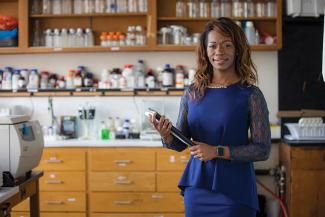MYTH MEETS THE POWER OF SCIENCE
Obatala’s “fat on a chip” technology offers research scientists tissue models that represent patients of varying demographics. The availability of diverse samples allows for a far earlier indication of response to drug compounds from a much wider patient population. Eliminating nonviable compounds quickly not only speeds up the testing time, which could result in less expensive prescription drugs, but also reduces adverse patient events.
Obatala Sciences is named for the West African god who was tasked with sculpting the human body. The significance of this name is two-fold for Frazier, who is a native New Orleanian and of Nigerian ancestry.
“Obatala [the mythic god] used naturally occurring materials, clay and mud, to form the human body, and we’re using naturally occurring biological materials. We start off with what’s routinely discarded as medical waste and then use those tissues to build more tissues that mimic tissues of the body. It seemed naturally fitting, considering that our goal is promoting diversity in research, to name the company after this West African deity.”































































